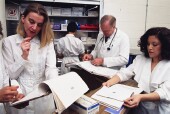- Are You Making This Expensive Thermostat Error This Winter?
- Recognizing the Signs of Hypothyroidism
- 10 Strategies to Overcome Insomnia
- Could Artificial Sweeteners Be Aging the Brain Faster?
- Techniques for Soothing Your Nervous System
- Does the Water in Your House Smell Funny? Here’s Why
- Can a Daily Dose of Apple Cider Vinegar Actually Aid Weight Loss?
- 6 Health Beverages That Can Actually Spike Your Blood Sugar
- Treatment Options for Social Anxiety Disorder
- Understanding the Connection Between Anxiety and Depression
Stroke Often Missed in ERs, Study Finds


Early signs and symptoms of stroke are often missed by emergency department doctors, a new study finds.
Every year, tens of thousands of Americans with symptoms such as dizziness or headache are misdiagnosed in the ER in the days or weeks before they suffer a stroke, according to the researchers.
Women, minorities and those under age 45 are the most likely to be misdiagnosed, according to the study published online April 3 in the journal Diagnosis.
“It’s clear that ER physicians need to be more discerning and vigilant in ruling out stroke, even in younger people,” study leader Dr. David Newman-Toker, an associate professor of neurology at the Johns Hopkins University School of Medicine in Baltimore, said in a Hopkins news release.
“Although stroke is less common in [younger people], we need to be more attuned to the possibility, particularly when the presenting complaint is dizziness or headache,” Newman-Toker added.
The study authors analyzed data from more than 187,000 people who visited more than 1,000 U.S. hospitals in nine states during 2008-09. They found that nearly 13 percent of people later admitted to the hospital with a stroke had been misdiagnosed and sent home from an ER in the 30 days before they were hospitalized.
Many of those misdiagnosed had dizziness and headache and were told they had less serious conditions such as ear infections or migraine, or they received no diagnosis at all, the study found. About half of those misdiagnosed were hospitalized with stroke within seven days, and more than half of those strokes occurred with 48 hours of misdiagnosis.
The risk of misdiagnosis was 33 percent higher in women and 20 percent to 30 percent higher in minorities, while younger people were nearly seven times more likely to be misdiagnosed, the researchers said.
Based on their findings, the researchers estimated that the number of missed strokes nationwide each year could be between 15,000 and 165,000. Differences in the health data routinely reported by states makes it difficult to estimate more precise numbers, Newman-Toker said in a Hopkins news release.
More information
The U.S. National Institute of Neurological Disorders and Stroke outlines stroke risk factors and symptoms.
Source: HealthDay
Copyright © 2026 HealthDay. All rights reserved.










